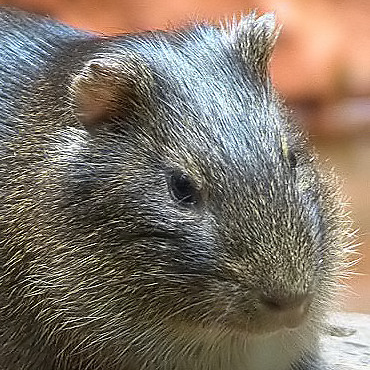The Brazilian guinea pig (Cavia aperea) (preá in Portuguese) is a guinea pig species widely ditributed across South America. It has been successfully mated to the domestic guinea pig, Cavia porcellus, though many females become infertile in successive generations.
Assembly
The CavAp1.0 assembly was submitted by Leibniz Institute for Zoo and Wildlife research on 2014/01/21 . The assembly is on the Scaffold level, consisting of 2,319,938 assembled into 3,131 scaffolds. The N50 size is the length such that 50% of the assembled genome lies in blocks of the N50 size or longer. The N50 length for the contigs is 1,039 while the scaffold N50 is 27,928,671.
Gene annotation
The gene annotation process was carried out using a combination of protein-to-genome alignments, annotation mapping from a suitable reference species and RNA-seq alignments (where RNA-seq data with appropriate meta data were publicly available). For each candidate gene region, a selection process was applied to choose the most appropriate set of transcripts based on evolutionary distance, experimental evidence for the source data and quality of the alignments. Small ncRNAs were obtained using a combination of BLAST and Infernal/RNAfold. Pseudogenes were calculated by looking at genes with a large percentage of non-biological introns (introns of <10bp), where the gene was covered in repeats, or where the gene was single exon and evidence of a functional multi-exon paralog was found elsewhere in the genome. lincRNAs were generated via RNA-seq data where no evidence of protein homology or protein domains could be found in the transcript.
In accordance with the Fort Lauderdale Agreement , please check the publication status of the genome/assembly before publishing any genome-wide analyses using these data.
More information
General information about this species can be found in Wikipedia.
Statistics
Summary
| Assembly | CavAp1.0, INSDC Assembly GCA_000688575.1, Jan 2014 |
| Base Pairs | 2,716,396,567 |
| Golden Path Length | 2,716,396,567 |
| Annotation provider | Ensembl |
| Annotation method | Full genebuild |
| Genebuild started | Sep 2016 |
| Genebuild released | Feb 2017 |
| Genebuild last updated/patched | Feb 2017 |
| Database version | 115.10 |
Gene counts
| Coding genes | 14,218 |
| Non coding genes | 3,614 |
| Small non coding genes | 2,585 |
| Long non coding genes | 16 |
| Misc non coding genes | 1,013 |
| Pseudogenes | 198 |
| Gene transcripts | 22,510 |
Other
| Genscan gene predictions | 39,214 |
